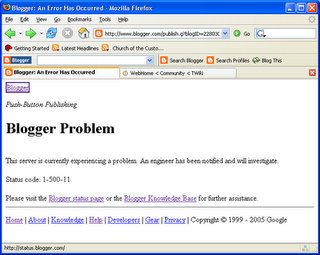Closed Source Dumbs Us Down
I was awake for quite a while last night. Probably lingering anxiety that the web site would crash again. Last night I decided to finish a book I had neglected to finish last month, John Taylor Gatto's Dumbing Us Down.
Gatto is a 30-year veteran of the New York City public school system. In 1991, he was named teacher of the year for New York State. Ironically, he used the occasion of his acceptance speech to blast the educational establishment, detailing his perceived flaws in compulsory public schooling. I'm hip with this subject matter. My family is homeschooling our kids and I think most of Gatto's criticisms are right on. While it's a little orthogonal to this posting, Gatto's conclusion is that compulsory public schooling is unreformable and should be abolished in favor of a variety of other educational choices, the way the US educational system was back in the early 1800s.
What struck me in the context of open source was a particular essay titled "The Congregational Principle." In it, Gatto discusses the advantages of local self-organization that typified Congregational churches in Puritan New England. The key paragraph for us here is:
Despite the lip service we have continued to pay to local choice ever since Congregational days, our schools are centrally planned and already have a national curriculum in place mediated by the textbook publishing industry and the standardized training of teachers. That our schools have failed spectacularly to give our children the education we want for them, or the selves we want, or to deliver on the dream of the democratic, classless society we still yearn for is obvious enough; what we miss is the logic of our failure. By allowing the imposition of direction from centers far beyond our control, we have time and again missed the lesson of the Congregational principle: people are less than whole unless they gather themselves voluntarily into groups of souls in harmony. Gathering themselves to pursue individual, family, and community dreams consistent with their private humanity is what makes them whole; only slaves are gathered by others. And these dreams must be written locally because to exercise any larger ambition without such a base is to lose touch with the things which give life meaning: self, family, friends, work, and intimate community. [Emphasis in the original.]
The impactful notion to me in there is that community, true community, gathers itself together, voluntarily, around shared dreams. The essence of open source is choice, and choice fosters the community that has become the stereotypical hallmark of healthy open source projects. Closed source eliminates choice. It gathers others together not of their own choice, but out of desperation for lack of alternatives. In Gatto's words, it makes us slaves and dumbs us down.
Am I being over the top? Maybe. But at 2:00 AM last night, it sure seemed to make some sense.

